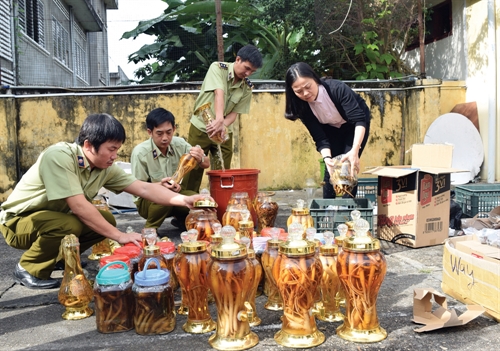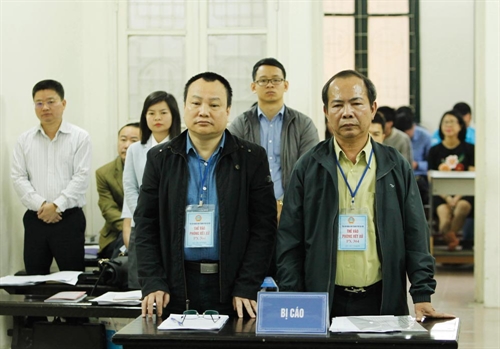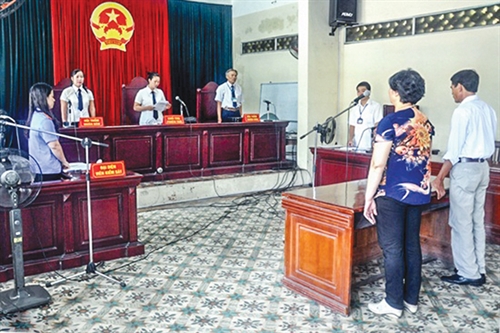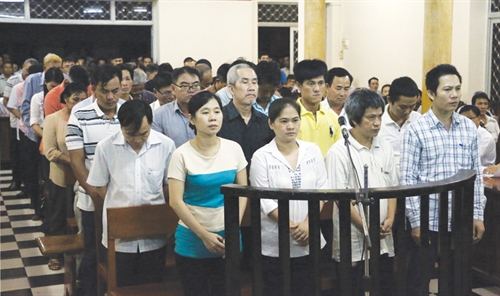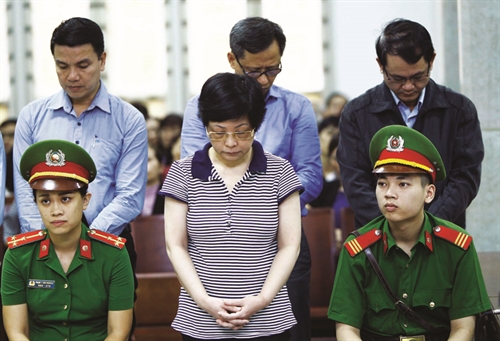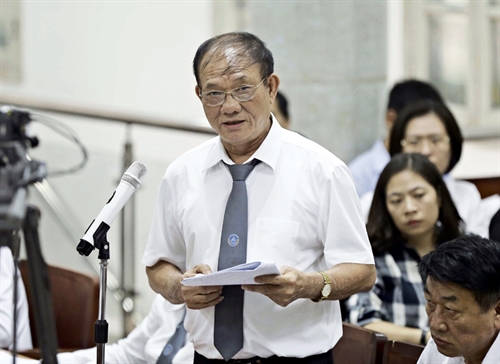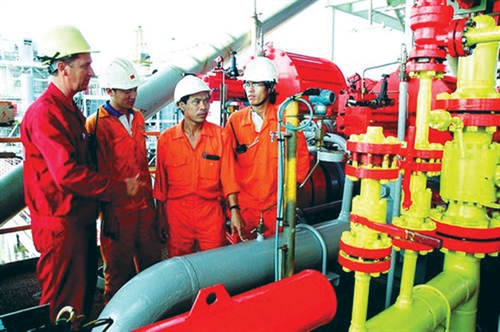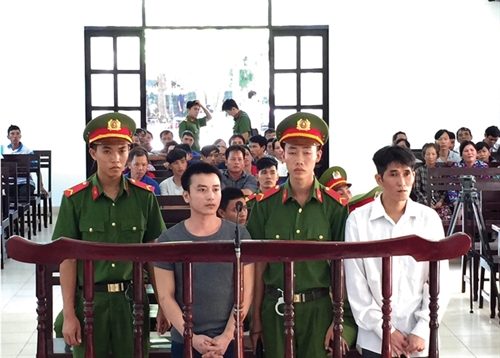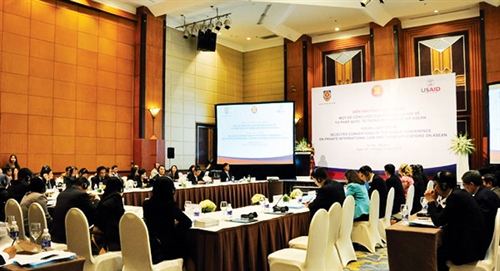Though promulgated in 2015, the new Criminal Procedure Code took effect on January 1, 2018, like the 2015 Penal Code (revised in 2017). This article browses specific changes in the Code designed to better protect human rights and citizens’ rights in criminal proceedings.
Assoc Prof., Dr. Nguyen Hoa Binh
Chief Justice of the Supreme People’s Court
More rights for proceeding participants
To concretize the 2013 Constitution and conform to the relevant treaties, the 2015 Criminal Procedure Code (the Code) adds rights of criminally charged persons to help them become aware of accusing evidence as soon as possible so that they can prepare their defense. These persons are now entitled to be provided with decisions on their charge; to present their statements without having to incriminating themselves or being forced to plead guilty; to read and take notes of copies of documents relating to their accusation or defense or copies of other documents relating to their defense after the investigation is completed; and to present evidence in addition to documents and objects (Articles 58 thru 61).
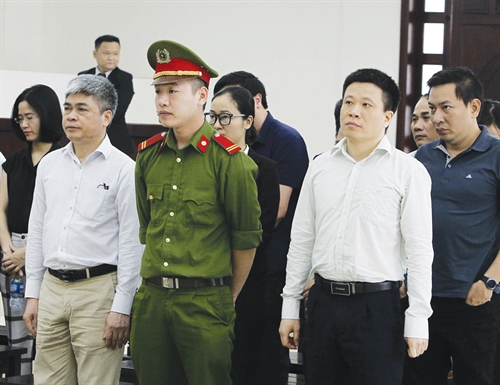 |
| Defendant Ha Van Tham (right), former Chairman of OceanBank’s Board of Directors, and Nguyen Xuan Son (left), former Director General of OceanBank, at the hearing for their economic crimes__Photo: Van Diep/VNA |
Under the Code, victims and persons with interests or obligations related to criminal cases also have more rights to protect their lawful rights and interests, such as to request expertise assessment and property valuation, to self-defend or ask others to defend them, and to be notified of results of settlement of criminal cases. Notably, victims may not only claim compensation for their damage but also demand penalties to be imposed on defendants (Articles 62 thru 65).
Witnesses and expert witnesses now have the right to request proceeding-conducting bodies to protect not only themselves but also their relatives from criminal threats (Articles 66 thru 70).
At the same time, the Code requires bodies and persons competent to conduct criminal proceedings to “respect and protect human rights and the lawful rights and interests of individuals, constantly examine the lawfulness and necessity of applied measures, and promptly cancel or change such measures if deeming that they violate the law or are no longer necessary.” (Article 8). Accordingly, only heads of proceeding-conducting bodies may decide to apply measures that restrict human rights and citizens’ rights. More specific bases and conditions for taking procedural measures are also provided to prevent their abuse. Any abuse of such measures during the settlement of criminal cases will result in the invalidation of collected evidence, reinvestigation or retrial, while abusing persons will be disciplined or prosecuted.
Stricter control of measures that restrict human rights
As per the 2013 Constitution, only laws may prescribe measures that restrict human rights and citizens’ rights in necessary cases for the purpose of protecting national defense, national security, social order and safety, and community ethics and wellbeing. In criminal justice, such measures may only be taken against certain persons when prescribed conditions are fully met. Once any of these measures is to be applied, it must properly ensure five factors: bases for application, deciding competence, order, procedure, and time limit for application.
Particularly, the Code enumerates all necessary measures for the process of proving crime. It introduces a new chapter (Chapter XVI) providing special procedural investigation measures, including secret audio recording and video recording; telephone tapping; and secret collection of electronic data, in order to best exploit evidence sources of incriminating value.
It also adds postponing exit from the country and blockading bank accounts to the existing preventive and forcible measures applicable to the accused.
In Article 119, the Code specifies clearer (quantitative) grounds for application of the measure of temporary detention to replace those of qualitative nature provided in the 2003 Criminal Procedure Code (the 2003 Code). It sets in Articles 121 and 122 specific grounds and conditions for bail and deposit of money as security to avoid temporary detention in order to ensure their practical effect.
Upholding the presumption of innocence principle
In light of the 2013 Constitution, the Code reaffirms that “a person charged with a criminal offense shall be presumed innocent until proven guilty according to the order and procedures prescribed in this Code and the court’s judgment of conviction takes legal effect.
If having insufficient grounds or being unable to clarify grounds for criminally charging or convicting a person according to the order and procedures prescribed in this Code, the bodies and persons competent to conduct the proceedings shall declare such person innocent.” (Article 13).
It states that “all criminal proceedings shall be carried out in accordance with this Code. It is prohibited to process criminal information or to initiate, investigate, prosecute and adjudicate criminal cases based on grounds and according to processes and procedures other than those prescribed in this Code.” (Article 7).
In case evidence is collected not according to the order and procedures prescribed in this Code, it will be considered invalid and must not be used for the settlement of criminal cases (Article 87), case files will be returned for additional investigation (Articles 236 and 280) or judgments will be cancelled for reinvestigation or retrial (Articles 358, 370 and 388).
In each proceeding stage, if the law-prescribed time limit for it has expired but it remains impossible or there are insufficient grounds to prove the crime, the proceeding-conducting body must conclude the criminally charged person is not guilty and restore his lawful rights and interests (Articles 230, 248 and 326).
Guaranteeing the right to defense
The Code has a whole new chapter (Chapter V) to adequately cover the right to defense instead of merely three articles as in the 2003 Code. In addition to the three subjects whose right to defense is guaranteed, namely persons held in custody, the accused and defendants, the Code also guarantees the right to defense for persons held in case of emergency and arrestees (Article 58).
Under Article 72, legal aid providers may also act as pro-bono defense counsels for defendants who are social policy beneficiaries, in addition to lawyers, representatives of defendants and people’s advocates as stated in the 2003 Code.
The Code requires proceeding-conducting bodies to appoint defense counsels not only for the accused or defendants who commit crimes subject to capital punishment but also for those charged for crimes subject to the highest penalty of 20 years’ imprisonment.
Under the 2003 Code, only the accused and their lawful representatives may select defense counsels, Article 75 of the Code states that relatives of the accused can also do so. However, Article 77 adds that “in case an arrestee, a person held in custody or a detainee at the stage of investigation refuses a defense counsel invited by his relative, the investigator and such defense counsel shall personally meet such person to confirm his refusal.”
A defense counsel has to wait for up to three days in order to be granted a defense counsel certificate under the 2003 Code. Now, with the registration procedure introduced by the new Code, he may start his work after 24 hours (Article 78).
Moreover, a defense counsel may participate in legal proceedings right from the time a person is arrested rather than having to wait for a detention decision as provided in the 2003 Code. Lawyers may also be invited from the stage of settling denunciations or reports on crimes in order to protect lawful rights and interests of their clients (Article 83).
Defense counsels may collect not only documents and objects but also evidence and are entitled to examine and express their opinions on related evidence, documents and objects and ask proceeding-conducting persons to examine and assess them (Article 73).
The Code also requires proceeding-conducting bodies to notify in advance defense counsels of the time and place of conducting proceedings so that the latter can participate in the proceedings in accordance with law (Article 79).
Protecting proceeding participants
The 2003 Code declares that victims, witnesses and other participants in legal proceedings as well as their relatives, when their life and health are endangered, their honor, dignity and/or property are infringed upon, shall be protected by competent proceeding-conducting bodies through applying necessary measures in accordance with law. Unfortunately, it does not establish any provision or mechanism to enforce this principle.
The Code contains a new chapter (Chapter XXXIV) on protection of offense denouncers, witnesses, victims and their relatives from revenge by criminals. This chapter specifies protection measures, including safeguarding protected persons, moving and keeping secret their places of residence, study and work, changing their background information and personal identification characteristics, deterring, warning or neutralizing harmful acts, and so on (Article 486).
Those measures are to be implemented for a specified period of time and can be stopped only when there are decisions of heads of proceeding-conducting bodies, which must state reasons for removing them.
Taking into account best interests of juveniles
To comprehensively protect juveniles who are defined as persons aged under 18 years, the Code adds procedures applicable to juvenile witnesses and victims, in addition to juvenile offenders. It lays down seven special principles to be adhered to when conducting criminal proceedings involving juveniles (Article 414).
The Code states that persons conducting criminal proceedings involving juveniles must have been trained or have experience in investigating, prosecuting or adjudicating criminal cases involving juveniles, and have necessary knowledge about psychology and education of these persons (Article 415).
Paying heed to the recommendation in the 2007 Convention on the Rights of the Child that “the arrest, detention or imprisonment of a child shall be used only as a measure of last resort,” the Code stipulates that a deterrent measure may only be applied when it is extremely necessary and there is a ground to believe that the application of supervisory and other deterrent measures is ineffective (Article 419). The length of temporary detention applicable to juveniles must be shorter than that set out for adults.
The Code allows proceeding-conducting persons to hold a confrontation between a minor victim and the accused or a defendant only as a measure of last resort to clarify circumstances of the case which cannot be settled without such confrontation.
To conform to the new policies on juvenile justice, the Code adds three judicial measures of reprimand, community-based conciliation and education in communes, wards or townships to be applied to juvenile offenders when proceeding-conducting bodies find it unnecessary to examine their penal liability (Articles 427 thru 429).
Shorter procedural time limits
The Code establishes the principle that all procedural measures, especially those restricting human rights and citizens’ rights, must be bound to a temporal limit. Therefore, it fixes time limits for the application of bail, deposit of money as security for release and ban on travel outside places of residence as the 2003 Code did not mention any timeframes for the application of these measures.
As compared to the 2003 Code, the Code shortens the time limit from 24 hours to 12 hours for investigative bodies to take statements and consider releasing persons held in case of emergency if there are insufficient grounds to believe that such persons are preparing for crime commission (Article 110).
It also sets a shorter period for temporary detention to avoid unnecessary stress for the accused and require proceeding-conducting bodies to take greater caution when deciding on the time of arresting and temporarily detaining persons. Under Article 119, such period is now one month for serious crimes, two months for very serious crimes or four months for particularly serious crimes. Particularly, the time for temporary detention of juvenile offenders is set to be equal to two-thirds of that allowed for adults.
The time limit for settlement of denunciations about proceeding-conducting persons’ violations is also reduced from 60 days to 30 days.-
